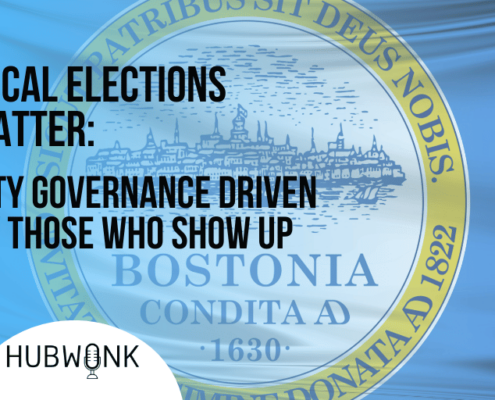Happy New Year from Pioneer Institute
/0 Comments/in Featured /by Editorial Staff Share on Facebook
Share on Twitter
Share on
LinkedIn
+
We hope you are taking time to celebrate and find peace during this season. Thank you for your support for Pioneer, which has helped us stay focused on steering the state’s debate on the pandemic response, and making progress on our key policy objectives. Here’s to a great 2021 for Massachusetts and the country.
Recent Posts

Black Box Budget: Late, Loaded, and Lacking Transparency
Joe Selvaggi talks with Pioneer Institute’s Senior Fellow in Economic Opportunity Eileen McAnneny about the features and flaws of the recently passed 2024 Massachusetts state budget now waiting for Governor Healey’s approval.

Dr. Peter Wood on Diversity and Anger in America
This week on The Learning Curve, Dr. Peter Wood, president of the National Association of Scholars, discusses the invention of the modern concept of diversity, the history of U.S. Supreme Court rulings on the concepts of diversity and race in college admissions, and how a culture of anger seems to pervade American life.

Sabotaging Strategic Success: How Price Controls Could Imperil U.S. Pharma Industry
Joe Selvaggi talks with Pioneer Institute’s Director of Life Sciences Initiative Dr. Bill Smith about the policies that drove biopharmaceutical company from Europe to the U.S., and how proposed, similar price controls in President Biden’s Fair Prices Act could distort incentives away from innovation and threaten the success of a thriving and vital U.S. industry.

UConn’s Prof. Manisha Sinha on The Slave’s Cause: A History of Abolition
This week on The Learning Curve, UConn Professor Manisha Sinha discusses the influential figures and seminal events that created the abolitionist movement. She describes the legacy of the transatlantic slave trade, Harriet Tubman and the Underground Railroad, the passage of the Thirteenth Amendment, and other key moments in the fight to end slavery.

Local Elections Matter: City Governance Driven by Those Who Show Up
Joe Selvaggi talks with Suffolk County Assistant District Attorney and candidate for Boston City Council’s 8th District Montez Haywood about the city council’s role in local governance and the salient issues at stake in the July 25 special election.

Pulitzer Winner Tamara Payne on the Life and Legacy of Malcolm X
This week on The Learning Curve, guest cohosts Alisha Searcy and Mariam Memarsadeghi interview Tamara Payne, award-winning biographer, about Malcolm X. They delve into his early life, rise in the Nation of Islam, civil rights movement involvement, pilgrimage, assassination, and ongoing legacy debate. Ms. Payne concludes with a reading from her book.

Diagnosing Debilitating Debt: Are We Undertaxing or Overspending?
Joe Selvaggi talks with Cato Institute’s Director of Tax Policies, Dr. Adam Michell about the sources of recent record levels of deficits and debt to understand a policy path toward fiscal sustainability that is politically viable.

Johns Hopkins’ Dr. David Steiner on Teaching Wisdom in Schools
This week on The Learning Curve, guest cohosts Charlie Chieppo and Alisha Searcy join Dr. David Steiner for a wide-ranging discussion about the importance of education as a means of transmitting enduring wisdom to young people.

Court Compels Colorblindness: Harvard Told No Exceptions for Equality Under Law
Joe Selvaggi speaks with Thomas A. Berry of Cato Institute about the Supreme Court’s ruling in Students for Fair Admissions Inc. v. President & Fellows of Harvard College, its impact on affirmative action, and what comes next for colleges seeking to ensure diverse enrollments.

Pulitzer Winner Stacy Schiff on Samuel Adams & American Independence
This week for the Fourth of July, the Learning Curve interviews Pulitzer Prize-winning biographer Stacy Schiff, who explores the American revolutionary Samuel Adams. She discusses Adams’ background, religion, and formative intellectual development, including the influences that Greco-Roman history, the Bible, and Enlightenment thinkers had upon his life and political thought.

Cara and Gerard on Their Time with The Learning Curve
This week on The Learning Curve, Cara Candal and Gerard Robinson close out their time as long-time cohosts of the podcast by sharing highlights and memories from over the last several years. They reflect upon the state of education reform, the growth of school choice, parental empowerment, the impact of the Great Books, and the wisdom of many well-known and influential guests.

Baking Young Minds: Scientific Concerns for Cannabis on Kids
Joe Selvaggi talks with professor of psychiatry Dr. Ryan Sultan about the findings of his recently released study on the effects of cannabis on the mental health of American adolescents. Dr. Sultan’s work shows a substantial correlation between cannabis use and negative mental health outcomes.

MBTA retirement fund is headed for a financial reckoning
The new MBTA Retirement Fund Actuarial Valuation Report shows the fund is only about 51 percent funded. In 2006, it was 94 percent funded. A “death spiral” generally accelerates when retirement system funding dips below 50 percent.

Becket Fund’s Eric Rassbach on Religious Liberty & American Schooling
Eric Rassbach of the Becket Fund for Religious Liberty discusses school choice and religious freedom, competing legal philosophies and views of the U.S. Constitution, and why issues pertaining to religion and schools remain so divisive at the K-12 level.

Curing Medicaid’s Cold: Unwinding Pandemic Expansion Before Federal Funds End
Joe Selvaggi talks with healthcare policy expert Dr. Brian Blase about Medicaid expansion during the COVID-19 healthcare emergency and how states can efficiently reexamine eligibility criteria so as to protect the vulnerable before federal support expires.

PRI’s Lance Izumi on Charter Schools & School Choice
Lance Izumi of the Pacific Research Institute discusses K-12 education reform, declining test scores, COVID-related learning loss, and the growth of education bureaucracy. He reflects on charter schools, school choice, and how U.S. history and civics should be taught.

Climate Change Reset: Catastrophic Consensus Cools As New Models Emerge
Joe Selvaggi talks with climate expert Dr. Judith Curry about the insights contained in her newly released book, Climate Uncertainty and Risk: Rethinking our Response, in which she tracks the evolution of climate science from model development, to political weapon, to an emerging view that the best response to a changing climate is to build resiliency.

Installing bike and bus lanes requires public debate
The problem isn’t with the concept of bike lanes but, rather, the lack of public conversation or transparency. Municipal governments are changing the infrastructure and character of entire neighborhoods and small commercial centers with little input from those most affected.



